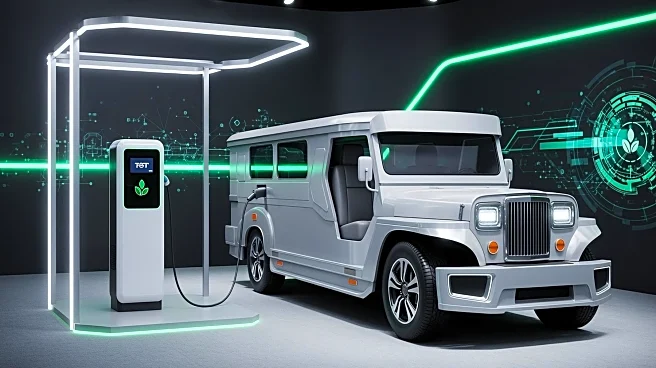What's Happening?
Basic Energy Corporation (BEC) introduced its new electric jeepney, the BASIC GEEP, at the 13th Philippine Electric Vehicle Summit held at the SMX Convention Center. The vehicle is part of BEC's Green Energy E-transport Program and is designed to support
the government's public utility vehicle modernization initiative. The BASIC GEEP features a 50 kW electric motor with a peak output of 110 kW, paired with a 66 kWh battery pack, offering an estimated range of 180 to 200 kilometers per charge. This range allows operators to complete multiple routes without needing to recharge during the day. The jeepney is built on a light cargo truck platform chassis and includes features such as GPS tracking, passenger Wi-Fi, and an Automated Fare Collection System.
Why It's Important?
The introduction of the BASIC GEEP is significant as it aligns with the Philippine government's efforts to modernize public transport by replacing aging jeepneys with safer and more environmentally friendly alternatives. BEC claims the electric jeepney can reduce operational costs by 50-60% compared to diesel-powered vehicles, due to lower electricity costs and reduced maintenance needs. This could provide economic relief to operators who face tight margins. The success of the BASIC GEEP and similar electric vehicles will depend on government subsidies, financing options, and the development of a supporting charging infrastructure.
What's Next?
BEC plans to establish a charging infrastructure network called Basic Recharge, which will include solar-powered stations. However, details regarding the number of stations, their locations, and the timeline for rollout are not yet available. The market adoption of the BASIC GEEP will depend on its real-world performance and economic viability, as well as the availability of government support and infrastructure development.
Beyond the Headlines
The shift towards electric jeepneys represents a broader trend in the Philippines towards sustainable transportation solutions. This transition could have long-term environmental benefits by reducing emissions and reliance on fossil fuels. However, challenges remain, including affordability and financing accessibility for transport groups, which could impact the pace of adoption.















